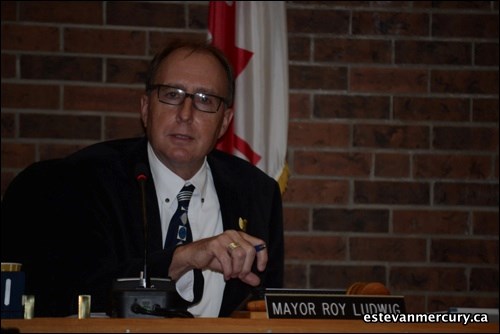Fresh off October's election win, Mayor Roy Ludwig and the newest version of city council got down to work Monday night.
Although they have been holding orientation sessions over the past couple of weeks, Monday night marked the first time council sat down for an open meeting and it didn't take long before the debate began on a couple of interesting topics.
Most notably was the decision to lower the speed limit in the city's residential areas.
The question was posed to voters through a plebiscite in the Oct. 24 municipal election and the local electorate voted yes to a reduction to 40 km/h from the current speed of 50 km/h.
However the decision was not a decisive one. As was reported in the final plebsicite results Monday, the yes side won by a mere 26 votes. The slim margin had led to some speculation that the new members might decide to maintain the status quo, but the question was mercifully put to rest as council voted for the reduction by a 5-1 margin.
Ludwig said although he wasn't a supporter of dropping the speed limit, he felt it was important to go with the will of local voters.
"I felt it was an issue of enforcement but I did say if it passed I would support it and since it did pass I am supporting it," Ludwig said following the meeting.
"I think since this did come forward from the police department and we respect that, I think now the onus is back on them to fulfil their request and carry through with the proper enforcement."
Ludwig added that one of the swaying factors for him was learning that with the speed limit set at 50 km/h officers were not issuing tickets unless drivers were 10 km/h over the speed limit because they were likely to be thrown out of court. With the limit down to 40 km/h it was felt the officers have a better chance curbing the issue of speeding in residential areas.
"It was brought to my attention that when it's brought to the judge, they tend to err on the side of the speeder and they can go as high as 9 km/h over and say that it's all right," he said. "So having said that, you just about have to go 10 km/h lower to meet the requirements that you need."
The debate in council chambers was relatively one sided as Councillors Lori Carr, Brian Johnson, Greg Hoffort and Kevin Smith all were in favour of lowering the limit. The lone dissenting vote was cast by Councillor Dennis Moore who said in his travels throughout the city, he was asked by residents to vote no to lowering the speed limit.
"Even today, I had a group of no less than six people say 'hold your spot' and the reason I want to hold my spot is I want to see if it makes a difference," he said.
"At this point I don't think it is going to make a bit of difference. In my particular area, I don't see anybody abusing the speed limit; they use common sense and drive accordingly to what is on the street or how many vehicles are on there. I had made up my mind that I was going no from the beginning and I voted no twice already so tonight I just wanted to hang on to that. I hope they prove me wrong and if they do so be it, I have listened to the people that I deal with so I wanted to stick with it and let's hope nothing happens with regards to injuries."
The decision does not take effect immediately as a bylaw will first have to be introduced and passed by council. It's likely the new limit will take place on Jan. 1 2013.
A number of other topics were discussed throughout Monday's meeting. Among them was a letter from SaskPower president Robert Watson in response to the City's request for mitigation money for the impact that the carbon capture and sequestration project at the Boundary Dam Power Station is having on Estevan and the local infrastructure.
Earlier this year the City hired MNP to conduct a study on the topic which was presented to SaskPower Minister Bill Boyd along with a request for money which is believed to have been in the $2 million range.
Although in his letter Watson didn't actually say no, he did state in a rather polite fashion that SaskPower has already contributed to the local economy in a number of ways, notably through the employment of local residents.
"We have also reviewed the economic data from various sources on the benefits that will flow to the City of Estevan because of the Integrated Carbon Capture and Sequestration Project currently under construction at the Boundary Dam Power Station," Watson said in the letter. "Estimates we have seen put the number of person years of employment created during the ICCS construction phase at over 5,800 and this is a significant gain for the City and its tax base."
Watson went on to say that Estevan will continue to benefit when the CCS project is complete as the local coal mining industry will remain strong and well over 1,000 jobs will be created in the oilfield as a result of enhanced oil recovery using carbon dioxide captured at Boundary Dam.
Ludwig said the City's request is not without precedent as Estevan received money when the Shand Power Station was constructed. He said the City will continue to work on the matter and that he has spoken directly with Boyd and remains optimistic.
"We are fully expecting some compensation," Ludwig said. "With all of the extra traffic, we have the wear and tear on the roads and with all the extra people, we have the wear and tear on our recreational facilities. It goes right across the spectrum."
The next regular meeting of city council is Monday night.




